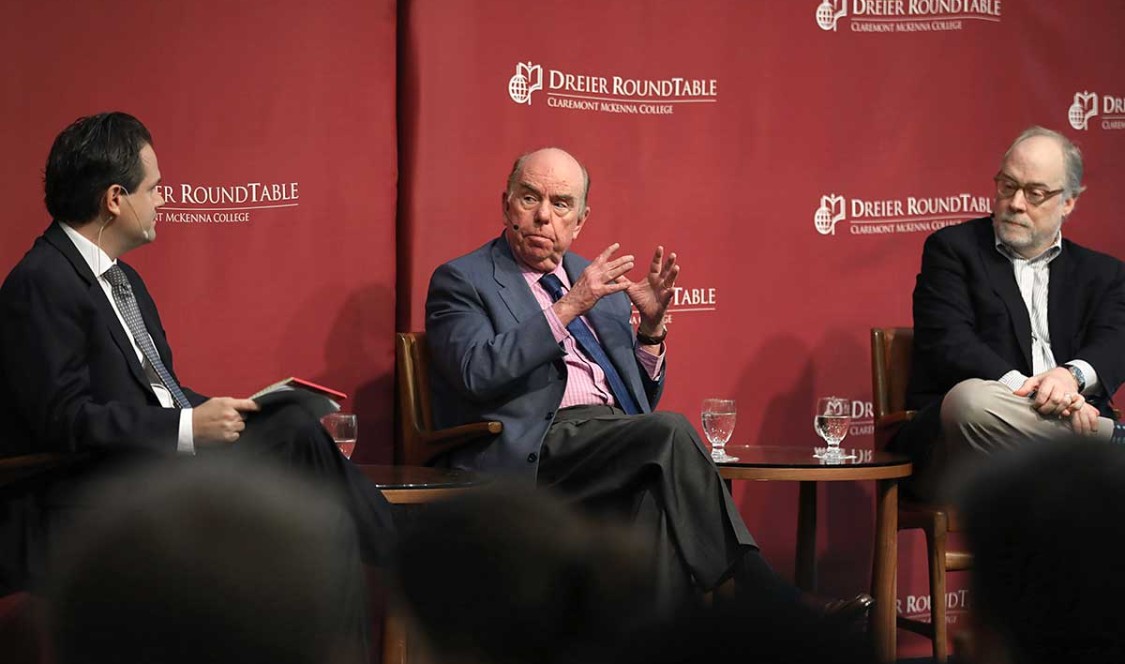History tells us that midterm elections are hard on the party that holds the White House. The upcoming November elections might prove even tougher for Republicans with a President who is, in the words of veteran political consultant Robert Shrum, “a disruptive force unlike anything we’ve seen in politics.”
That Republicans will likely lose control of the House of Representatives was one of several points of agreement between Shrum, the veteran Democratic adviser and pundit, and Mike Murphy, a leading consultant on the other side of the aisle, at the Dreier Roundtable Thursday at the Marian Miner Cook Athenaeum. The Dreier Roundtable is a multidisciplinary program that encourages student engagement in public affairs.
The event, billed as “Midterm Madness: Political Pros Share Their Insights on the Upcoming Election,” found Shrum and Murphy predicting an election year dominated by reactions to a polarizing president. Shrum, director of the Jesse M. Unruh Institute of Politics at USC Dornsife College of Letters, Arts, and Sciences, has advised candidates including Edward Kennedy, Joe Biden, John Glenn, John Kerry, and Al Gore. Murphy, who co-directs the Center for the Political Future at USC Dornsife, has led campaigns for candidates including Jeb Bush, Mitt Romney, and Arnold Schwarzenegger, and served as a senior strategist for the late Senator John McCain.
“We know there is a lot of water heading our way,” said Murphy, referring to the so-called Democratic blue wave. “We are not sure it is not a tsunami.”
Midterm elections typically ride on two factors: the popularity of the President and the state of the economy. Despite low unemployment and a long-running bull market, polls show that people remain worried about jobs and wages.
“The excitement about the economy, how people perceive it, is more muted than might be expected,” Murphy said. “If the president was adroit and could make this election about the economy doing better, then the Republicans would have something to fight with.” Shrum agreed: “The reason the economy is not the driving force is that he fills up all the space, he takes up all the oxygen.”
Shrum noted that women, as both candidates and voters, will likely be the pivot on which races turn. More women are running for office than ever, and women who voted for President Trump in 2016 are “pulling back,” he said. “In both terms of the number of candidates elected and who is going to influence the outcome, this is going to be the second year of the woman. The driving, decisive force in the election is going to be women voters.”
The pundits did not mention how women’s reactions to the Brett Kavanaugh Supreme Court hearings might amplify that effect. Though the hearings appear to be shoring up support among Trump loyalists in red states, Murphy said that demographic is too small to impact the national landscape.
Asked by moderator Zachary Courser, Research Director of the Dreier Roundtable and a Visiting Assistant Professor of Government at CMC, to turn their focus to the Senate, the pundits agreed that it is possible for Democrats to win a majority of seats, but not likely. As for gubernatorial races, Texas is the state to watch, where Beto O’Rourke is challenging Ted Cruz.
“If O’Rourke wins in Texas, I think the Democrats will probably take the Senate,” Shrum said. “I think he will be the canary in the coal mine.” Races in Nevada, Florida and Tennessee may also be indicators of Democratic strength.
Voters in midterm elections tend to be older white males, Murphy said. The critical difference, he said, would be if groups such as Latinos, other people of color, Millennials, and newly registered voters are inspired to turn out for the midterms, which they typically skip. In that case, the political waters ahead may well be very deep and very blue.
–Susan Price

